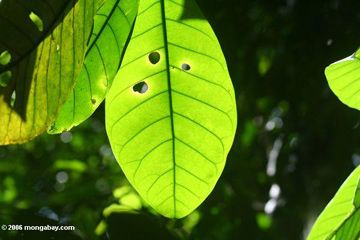Undisturbed tropical forests are absorbing nearly a fifth of carbon dioxide released annually by the burning of fossil fuels, according to an analysis of 40 years of data from rainforests in the Central African country of Gabon.
Writing in the journal Nature, Simon Lewis and colleagues report that natural forests are an immense carbon sink, helping slow the rise in atmospheric CO2 levels.
“We are receiving a free subsidy from nature,” said Simon Lewis, a Royal Society research fellow at the University of Leeds. “Tropical forest trees are absorbing about 18% of the CO2 added to the atmosphere each year from burning fossil fuels, substantially buffering the rate of climate change.”
But the good news may not last for long. Other research suggests that as tropical forests fall to loggers, dry out due to rising temperatures, and burn, their capacity to absorb carbon is reduced.
 Leaf in an African rainforest. Why are mature forests still absorbing carbon? In a “News & Views” response to Lewis et al. Helene C. Muller-Landau of the Smithsonian Tropical Research Institute in Panama ponders whether the finding that African forests are a massive carbon sink is a sign of atmospheric change or of recovery from past trauma. “Trees cannot grow for ever, and neither can forests: in the absence of disturbances that kill trees en masse — such as fires, hurricanes or logging — every forest will eventually reach a point at which tree growth and death are in equilibrium, and at which the average change in tree carbon stocks is zero,” she writes. “It is thus surprising that undisturbed tropical forests currently do not seem to be at equilibrium.” She suggests two explanations: 1) that African forests may be in the process of recovery from past disturbances that could have been natural or anthropogenic; or 2) that forests are reacting to climate change or increased CO2 levels. |
“Whatever the cause, we cannot rely on this sink forever,” said Lewis. “Even if we preserve all remaining tropical forest, these trees will not continue getting bigger indefinitely.”
The research, which combined the new data from African rainforests with previously published data from the Americas and Asia, lends support to the idea that old-growth forests are critical to addressing climate change. Recent climate negotiations have included debates on compensating tropical countries for reducing emissions from deforestation and forest degradation (“REDD” or “avoided deforestation”).
“To get an idea of the value of the sink, the removal of nearly 5 billion tonnes of carbon dioxide from the atmosphere by intact tropical forests, based on realistic prices for a tonne of carbon, should be valued at around £13 billion per year,” said study co-author Lee White, Gabon’s Chief Climate Change Scientist. “This is a compelling argument for conserving tropical forests.”
“Predominantly rich polluting countries should be transferring substantial resources to countries with tropical forests to reduce deforestation rates and promote alternative development pathways,” added Lewis.
The new findings show that tropical forests account for roughly half of the 8.5 billion tons of carbon that is sequestered in terrestrial sources each year, the balance is absorbed by soils and other types of vegetation. Another 8.5 billion tons dissolved in oceans, leaving 15 billion of the 32 billion tons emitted by humans each year in the atmosphere. Deforestation accounts for roughly 6 billion tons of greenhouse gas emissions — greater than the emissions from all the world’s planes, ships, trucks, and cars.
CITATION: S.L. Lewis et al. Increasing carbon storage in intact African tropical forests. NATURE| Vol 457| 19 February 2009